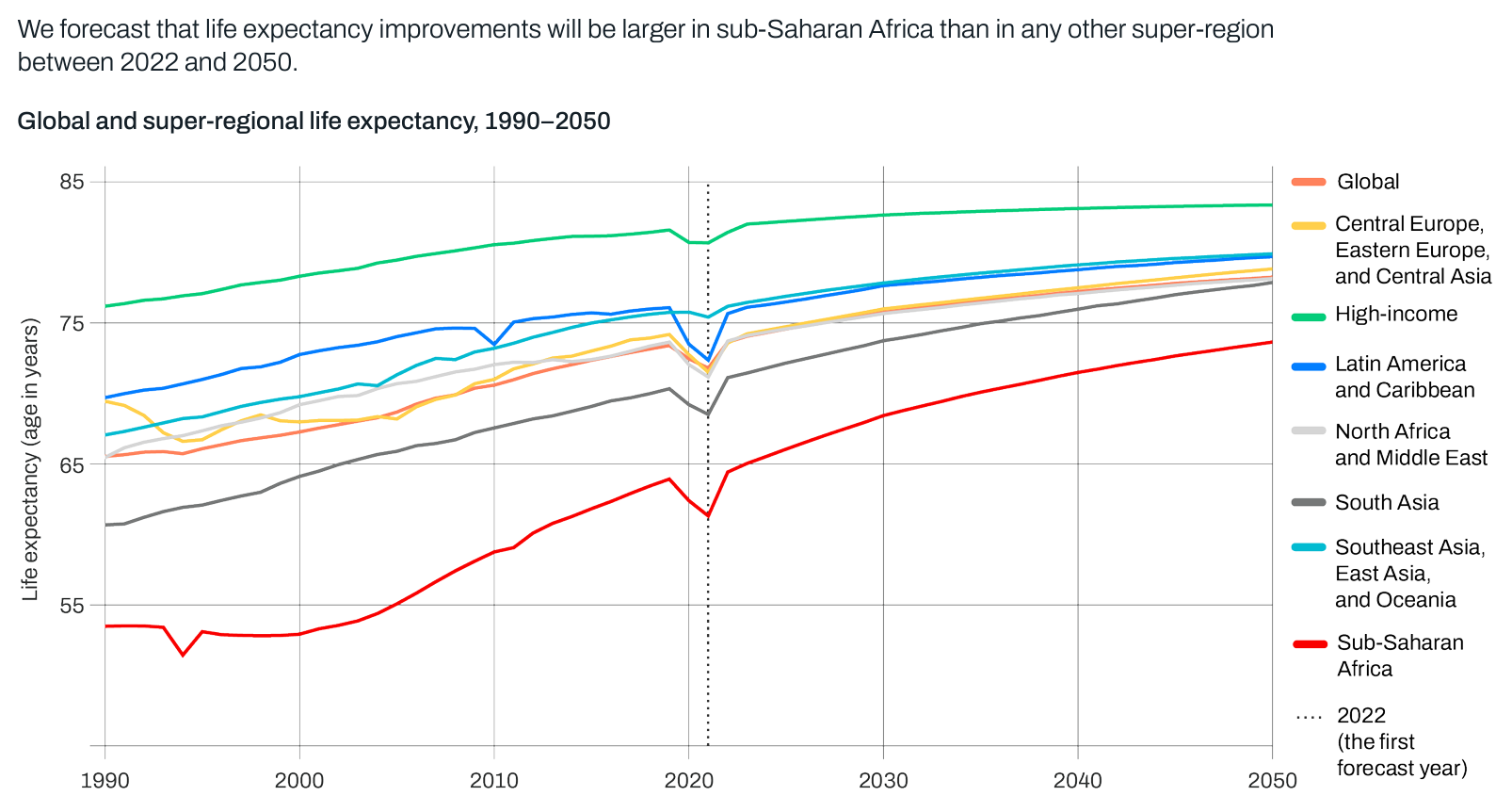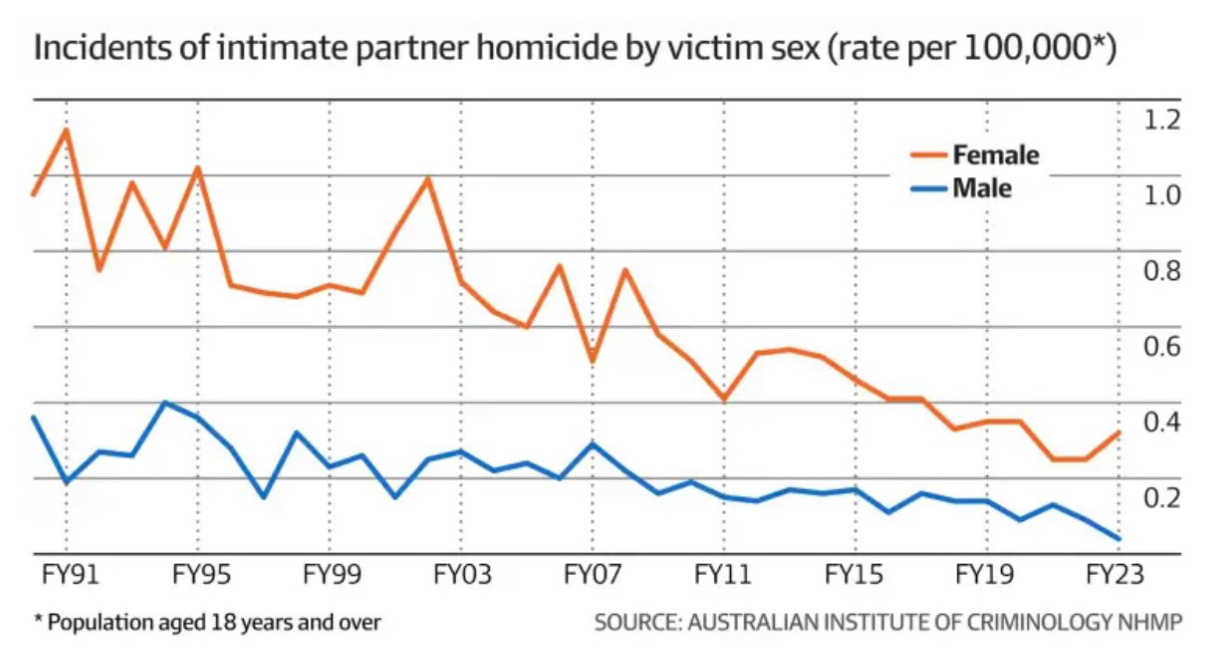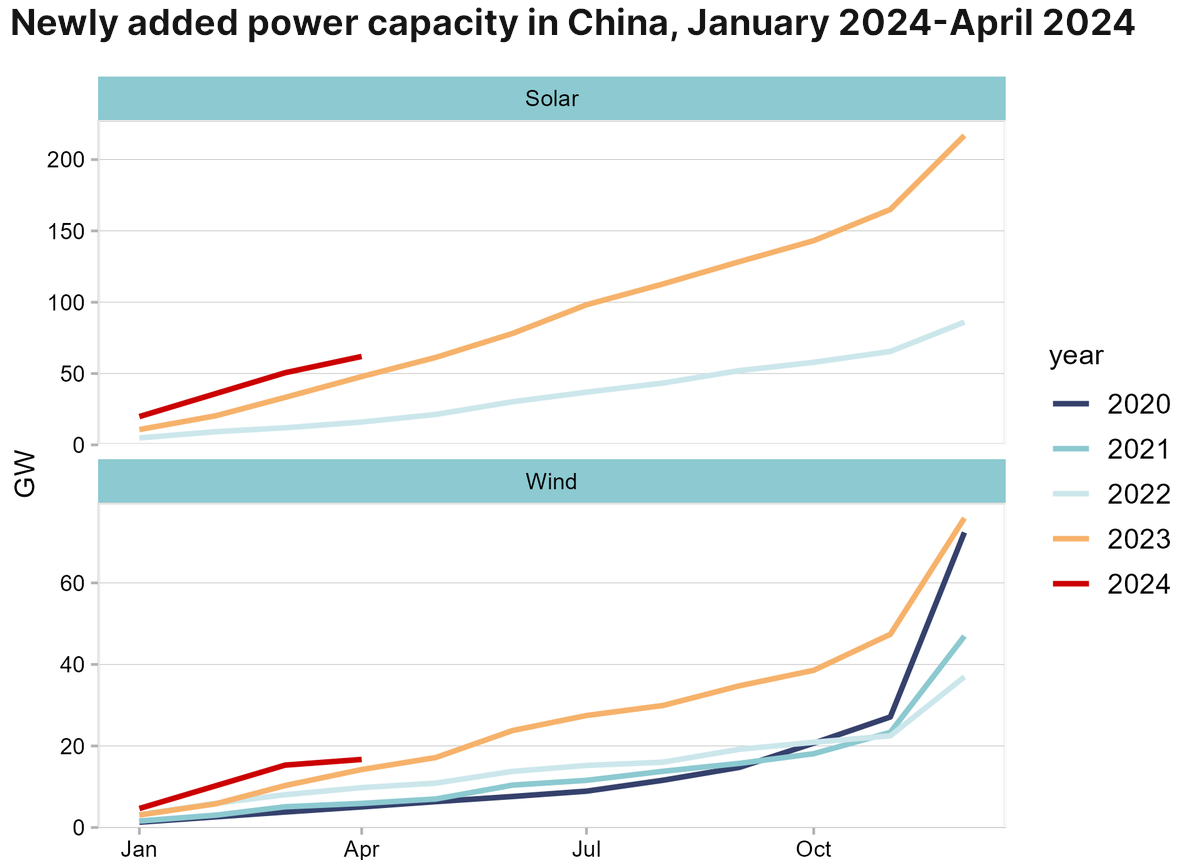Hi everyone, Gus here. My new TED talk is out. If you're curious, here are some posts about my creative process, how we made the visuals, and what I learned along the way. If you're looking for some other recommendations, the conference opened this year with a conversation between Palestinian peacemaker Aziz Abu Sarah and Israeli peacemaker Maoz Inon, and I don't think anyone who was there will ever forget it.
Good news for people
Global life expectancy to increase by nearly five years by 2050
Will the future be better? The Global Burden of Disease Study, just published in The Lancet, forecasts that global life expectancy will increase by 4.9 years for males and 4.2 years for females between 2022 and 2050, largely driven by improved survival from cardiovascular diseases as well as from a range of communicable, maternal, neonatal, and nutritional diseases. IHME

Central African Republic rolls out R21 malaria vaccine
UNICEF has delivered 43,000 doses via air transport, marking the start of the WHO’s highly anticipated vaccination campaign. It's the first country to start using the R21 malaria vaccine in routine childhood immunisation. An additional 120,000 doses are slated to arrive in the next few days, a big moment for one of the most malaria-affected countries in the world. Gavi
India has made significant progress on tuberculosis
India’s efforts to ensure early detection and treatment, along with a host of community engagement efforts, have resulted in a decline of 16% in TB incidence (new cases emerging each year) and a 18% reduction in mortality since 2015. The Health Ministry has now set 2025 as the target for eliminating the disease altogether. The Hindu
There's new hope for an HIV vaccine
An experimental vaccine developed at Duke University has been shown to generate low levels of antibodies needed to target HIV in a small group of people enrolled in a clinical trial. It’s a first but much-needed step towards preventing infection. 'This is one of the most pivotal studies in the HIV vaccine field to date.' Wired
Some education success stories in Africa
In the DRC, the elimination of primary school fees in public schools has resulted in 3.7 million more children gaining access to education; Tanzania's results-based education financing program has led to an additional 1.8 million students enrolling in primary schools; and in Kenya, the Tusome program has improved the reading of Grade 1 and 2 students by the equivalent of 3-5 years of schooling.
New hope for Pakistan's mistreated workers
Germany is Europe’s largest economy and clothing importer, and its Supply Chain Act now requires companies with over 1,000 employees to minimize human rights violations across their supply chains. In Pakistan, the law is already compelling factories to comply with minimum wage laws, provide workers with written contracts, and give bonuses—and it looks like it's just the start. Fuller Project
Melinda French Gates is committing $1 billion to women's rights
The cavalry has arrived. 'Over the past few weeks, as part of the $1 billion in new funding I’m committing to these efforts, I have begun directing new grants through my organization, Pivotal, to groups working in the United States to protect the rights of women and advance their power and influence.' NYT
Marijuana moves closer to declassification in the United States
The US Drug Enforcement Administration is moving towards reclassifying marijuana as a less dangerous drug, recognising its medical uses and lower potential for abuse. This would move marijuana from Schedule I to Schedule III, but it would not be legalised for recreational use. AP
Domestic violence rates in Australia fall by two-thirds since the 90s
The rate of women killed by their partners has fallen by two-thirds over the past 34 years, part of a long-term trend of domestic and acquaintance homicide rates falling by more than half since 1989. Factors cited include better victim safety, stronger home security, improved policing, economic affluence, an ageing population, higher imprisonment rates, and higher immigration. AFR

More good news you didn't hear about
A push to provide clean cooking options for over a billion people in Africa has raised $2.2 billion in pledges from governments and the private sector. The United States is slowly turning the tide on mass incarceration, expanding freedom and opportunity for millions. The real immigration crisis? Not enough immigrants. Crime in Seoul is declining, even as anxiety about the issue is rising. One man's determination has reduced traffic deaths on some roads in India by 40%, and his solution has been rolled out to the 15 most dangerous highways in the country. The Takaful and Karama (Solidarity and Dignity) Programme in Egypt now reaches 4.67 million vulnerable households. In Massachusetts, a 'millionaire's tax' has earned the state more than $1.8 billion for education and transportation. Won't somebody think about the kids? The coastal city of Beira, Mozambique, is using faster weather data and community mobilisation to better prepare for cyclones.

If it bleeds, it leads
Matthew Yglesias says it better than we ever could.
The world, including the United States of America, obviously has problems, and some things really are trending in a bad direction. And yet this has always been the case. The main thing that has actually changed is that the media landscape has become much more competitive and people (yes, people like you) prefer to click and share on negative stories. So a lot of people spend time doomscrolling, amping up negativity on their social media feeds to maximize engagement, and propagating a worldview that says the best way to be a good citizen is to engage in performative sobbing or raging.
This is all, I think, a mistake.
Trends are broadly positive and have been for a long time. Many bad things continue to happen, but that has always been the case, and problems can generally be solved more effectively by trying to slice them down into specific, narrow pieces rather than lumping everything together. Most negativity results from conscious or unconscious framing choices that compete evolutionarily in a “survival of the most downbeat” framework.
The best thing to do to live a happy life is to feel like you are a person with agency and the ability to exert control over the world. And the best way to do that is not to tune out the problems of the world, but to cut down on the doomscrolling and try to think of specific ways you can take action to help with tractable problems.
Good news for the planet
China’s carbon emissions may now be ‘in a structural decline’
Two separate new analyses suggest that China’s carbon dioxide emissions peaked in 2023 and will start declining from this year onwards. Bloomberg is predicting that global emissions could fall as much as 2.5% in 2024, and an analysis from the Centre for Research on Energy and Clean Air has come to a similar conclusion, citing a fall of 3% in China’s carbon dioxide emissions in March.
Why? This has a lot to do with it.

Clean electricity on the cusp of overtaking fossil fuels in the US
In March 2024, renewables and nuclear generated 49.4% of the USA's electricity, and in April 2024, it built 3,980 MW of carbon-free electricity generating capacity. How much fossil fuel capacity was added in that same month? 1 MW. The country is getting close to the point where, for the first time in generations, fossil fuels will provide less than half its electricity.
European cities are embracing nature-based solutions
A new report by the European Environment Agency (EEA) has found that European cities are increasingly turning to nature-based solutions like urban forests, water management, and greening buildings to help combat climate change. Germany is leading the way, with green roofs and facades to enhance rainwater absorption, cool buildings, and improvements to air quality. WEF
Uzbekistan and Kazakhstan are reforesting a dried-out sea
Both countries are working with locals to plant drought-resistant plants in the dry lakebed of the Aral Sea to prevent sandstorms and mitigate the health impacts of toxic dust. Over the past five years, a forest covering 1.7 million hectares has taken root on the Uzbekistan side of the border, with an additional 200,000 hectares planned for this year. Mongabay
Decrease in cancer-causing pollution from refineries
Oil refineries across America have reduced their emissions of benzene—a toxic chemical that can cause leukaemia and other blood cancers—thanks to EPA regulations and monitoring. The number of refineries exceeding action level for benzene in 2023 halved from 2020, ensuring greater protection for hundreds of communities positioned nearby. Washington Post
Mangrove conservation in Rio de Janeiro
Over the past four years, the Green Guanabara Project in Rio de Janeiro has restored a huge area of mangroves, planting 30,000 trees in Guanabara Bay. The initiative will help safeguard one million residents in the nearby city of São Gonçalo from flood while preserving marine biodiversity and reducing river pollution. PBS
Succulent restoration in South Africa
An initiative in South Africa will restore a native carbon-absorbing succulent, called spekboom, over 100,000 ha of degraded land across the Eastern and Western Cape provinces. In addition to removing an estimated 30 million tonnes of carbon, the project will also create 1,000 jobs for local communities. Straits Times
The Recovering America's Wildlife Act is a bipartisan unicorn
The RAWA is poised for another vote on the US Senate floor. If successful, it will secure an annual $1.3 billion for wildlife agencies and $97.5 million for conservation work by tribal nations, reaching thousands more species in need of conservation and potentially restoring some populations before they become endangered. High Country News
US conservationists take on mining interests
A gold mining project in California’s Sierra Nevada Mountains has been struck down to protect the habitats of unique species including bighorn sheep, golden trout, and the elusive slender salamander and Mount Lyell salamander. In Arizona, tribal nations have joined forces with the federal government to protect the Baaj Nwaavjo I'tah Kukveni – Ancestral Footprints of the Grand Canyon National Monument from uranium mining.
Restoration of the Elwha reveals long-term benefits of dam removal
Scientists in Washington State studying the Elwha River delta over the decade since the dam came down have revealed the positive impact the dam removal has had on coastal ecosystems. Despite an initial die-off of kelp due to suspended sediment, the river’s mouth has now been completely transformed, with a series of lagoons and new ecosystems providing 'a beautiful deltaic habitat.' Hakai Magazine

More music for those who will listen
Scientists have created a butterfly forest in the Italian Alps to help boost the global butterfly population. The 'mountain jewel' plant, which was believed to be extinct in the UK, has been re-introduced in a top-secret location. A flightless bird and a gliding mammal thought to be extinct have been discovered in the wild. Colorado lawmakers approve bill to restore wolverines to the Rocky Mountains. How the Miccosukee Tribe of Indians of Florida plan to stop oil drilling in the Everglades. Water quality levels on the Klamath River are improving amid dam removal work. A rare songbird's epic journey from the edge of extinction. Measures to protect India’s Ganges river dolphin are working, with population numbers increasing to 4,000. Increased protections for the world’s largest urban national park in Brazil. The 'remarkable' return of an endangered frog species in California. Meet the ‘River Champions’ who are fighting to preserve Europe’s last free-flowing rivers. A timely reminder from Brenna Quinlin.

That's it for this edition! Let us know what you think of the TED talk, and if you're feeling generous, we'd really appreciate a share.
We'll see you next week.
With love,
Gus and Amy



